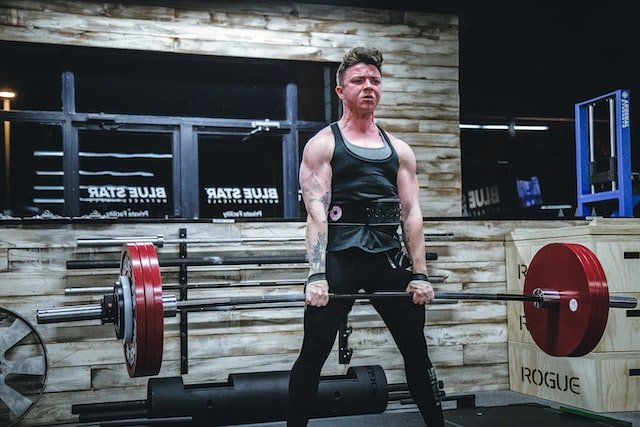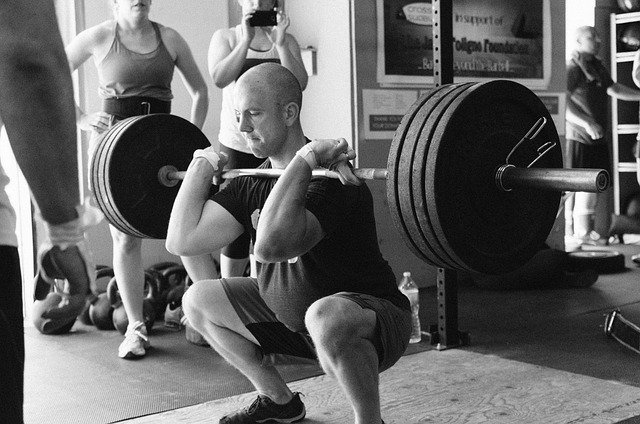
Why Do Some People Vomit When Lifting Heavy Weights? 14 Things To Consider
When you start lifting weights, the first thing you may notice is that your muscles feel sore. But what you may not know is that there’s another potential side effect of weightlifting – vomiting.
Believe it or not, some people actually throw up when they lift heavy weights. So why does this happen? And more importantly, is there anything you can do to prevent it?
Keep reading to find out!
Why do some people vomit when lifting heavy weights?
There are a few different reasons why some people may vomit when they lift heavy weights. This is because when you lift heavy weights, you create a lot of intra-abdominal pressure, which is the pressure that your organs feel from the weight of your muscles and connective tissues. You may experience a drop in blood sugar, a lack of oxygen or encounter reduced blood circulation as your body needs these things to operate and lift heavy weights, but if lacking can cause sickness. You need to fuel your workouts but if you eat or drink too close to lifting, your body may not have enough time to digest the food properly and purge it. When your body is under a lot of stress and massive exertion, it can trigger your fight-or-flight responses. Your body releases hormones that can help you build muscle. However, these hormones can also have the opposite effect and if you’re doing high-intensity workouts, they can also lead to experiencing these issues. Doing too much too soon, moving or stopping too fast, and trapping organs can also lead to sickness. Straining is also a big factor in why some people vomit when they lift heavy weights. Wearing clothing that are too thick or working out in hot conditions can also lead to nausea.
Exercise affects the gastrointestinal tract in different ways.
Some people feel nauseous when they work out on an empty stomach, while others may have the opposite reaction and need to eat something before they work out.
The type and intensity of your workout can also play a role in how your body reacts.
Let’s look at some of the main reasons why people face this issue and ways to get around the problem as quickly as possible.
Intra-abdominal pressure
One of the main reasons people feel sick when they lift heavy weights is due to intra-abdominal pressure (IAP).
When you lift heavy weights, your muscles and connective tissues put a lot of pressure on your organs. This can cause a drop in blood sugar, lack of oxygen, or reduced blood circulation.
This is the pressure that your organs feel from the weight of your muscles and connective tissues and it can be very dangerous if not managed correctly.
If you’re experiencing any of these issues, it’s important to stop lifting and seek medical attention immediately.
One of the best ways to avoid IAP is to warm up properly before lifting.
Warming up helps increase blood flow to your muscles and connective tissues and it also helps loosen up your joints.
It’s also important to eat a balanced diet and stay hydrated.
Eating a healthy diet helps your body get the nutrients it needs to function properly and stay strong.
Fight-or-flight response
When you work out, your body releases hormones that help you build muscle. However, these hormones can also have the opposite effect and if you’re doing high-intensity workouts, they can also lead to nausea and vomiting.
This response dates back to our early ancestors who needed to be able to run away from predators or fight them off.
Nowadays, we don’t usually have to worry about being chased by a lion while we’re working out. However, our bodies still respond in the same way to stress and exertion automatically.
You can avoid this problem by starting slowly and gradually increasing the intensity of your workouts.
This will allow your body to adjust to the new demands placed on it and help prevent the release of excessive amounts of hormones.

Dehydration
When you work out, you lose a lot of fluids through sweat. If you don’t replace these fluids, your body will become dehydrated. Dehydration can cause nausea, lightheadedness, and dizziness.
It’s important to drink plenty of fluids before, during, and after your workout. Water is the best choice, but you can also drink sports drinks to replenish electrolytes.
If you’re feeling nauseous, stop working out and drink a glass of water or a sports drink. You should also eat foods that are high in water content, such as fruits and vegetables.
Related: Why does shouting make it easier to lift heavy weights?
Overtraining
When you overtrain, your body doesn’t have time to recover between workouts. This can lead to fatigue, muscle soreness, and nausea.
If you’re feeling nauseous, it’s important to take a break from exercise and let your body recover.
You can avoid overtraining by making sure you’re getting enough rest and recovery time between workouts.
If you are new to lifting weights, you might need some time to get accustomed to it. Or, if you have recently increased the volume of your training sessions, that may be the source of the problem.
Try backing off for a few days and see if the feeling dissipates.
Just remember to take it slow at first, warm up properly, and stay hydrated. With time you’ll be able to build up your strength and endurance without issue.
If you notice that you’re feeling sick more often than usual, it’s a good idea to cut back on the intensity or duration of your workouts.
Drop in blood sugar
When you lift weights, your body uses up a lot of energy. If you haven’t eaten recently, your blood sugar will drop and you may start to feel nauseous.
It’s important to eat a meal or snack before you work out. A small amount of sugar can also help to raise your blood sugar levels.
If you start to feel nauseous during your workout, stop and have a snack or drink something sugary.
You can also try eating small meals or snacks every few hours to keep your blood sugar levels stable.
If you are diabetic and lifting weights, it’s especially important to monitor your blood sugar levels. Make sure you eat before your workout and check your blood sugar levels frequently.
Eating and drinking too close to training or not at all
Another common reason people vomit when lifting weights is that they have eaten or drunk too close to training.
If you eat or drink right before you work out, your body won’t have time to digest the food and you may start to feel nauseous.
It’s important to eat a meal or snack at least an hour before you work out. And, make sure you drink plenty of fluids throughout the day.
If you’re feeling thirsty during your workout, stop and drink some water.
If you’re feeling nauseous, it’s also a good idea to avoid drinking alcohol before or after your workout.
On the flip side, if you haven’t eaten anything prior to training, you may also start to feel nauseous. It’s important to eat something before you work out so that your body has the energy it needs.
A light snack or meal that is high in carbohydrates and low in fat is usually the best option.
Some people also find that they feel nauseous if they exercise on an empty stomach. If this is the case, try eating a small snack before you work out.
Lack of sleep
When you don’t get enough sleep, your body doesn’t have time to recover from your workouts. This can lead to fatigue and nausea.
If you’re feeling nauseous, it’s important to take a break from exercise and get some rest.
You can avoid this by making sure you’re getting enough sleep each night. Most adults need 7-8 hours of sleep per night.
If you are new to lifting, this might be something you need to get used to, or if you have recently increased the volume of training, this may be the root cause.
Just remember to take it slow at first, warm up properly, and stay hydrated. With time you’ll be able to build up your strength and endurance without issue.
Reduced blood circulation and lack of oxygen
When you lift weights, your muscles need oxygen to help them contract. If your blood circulation is reduced or lacks oxygen, your muscles may not get what they need and you may start to feel nauseous.
There are a few things that can cause reduced blood circulation or lack of oxygen, including dehydration, low blood sugar, and lack of sleep.
It’s important to drink plenty of fluids throughout the day and to eat a meal or snack before you work out.
If you start to feel nauseous during your workout, stop and rest. If you can, lie down with your legs elevated.
You can also try massaging your muscles to help increase blood circulation. If you’ve just started lifting or increased your training volume, this might be the issue.

Massive exertion
Sometimes people puke during exercise because they are pushing themselves too hard.
If you’re working out at a high intensity, your body may start to feel overwhelmed. This can lead to nausea and vomiting.
It’s important to listen to your body and to take breaks when you need them.
If you’re feeling nauseous, it’s a good idea to stop and rest. Drink some water and give your body a chance to recover.
If you are attempting to lift a very heavy weight, you are going to be exerting a lot of energy. This will cause your heart rate to go up and can lead to nausea.
Remember to warm up and use a spotter when necessary. Start with a weight you can handle and work your way up.
Don’t also forget that you cant redline your body all the time. You need to have days where you just do a moderate workout or even take a complete rest day.
Related: What do you do on a bad day at the gym?
Doing too much too soon
If you’re new to exercise or have recently increased your training volume, you may be doing too much too soon.
Your body needs time to adjust to new exercise routines. If you jump into something too intense, your body may not be able to handle it.
This can lead to nausea and vomiting, especially if you are trying to lift a weight you really have no business attempting!
It’s important to ease into new exercise routines and to increase your training volume slowly.
If you’re feeling nauseous, take a break from exercise and focus on recovery. Drink plenty of fluids and get enough sleep. Your body may also take a little adjustment to the new way of things.
If you have been lifting for a while now and are still finding that you spew during workouts, it might be time to see a doctor to check for any other underlying issues.
It’s natural to want to train as much as possible when you first begin working out…however, it’s important to remember that your body needs time to recover.
Slow and steady wins every time, especially with lifting.
Moving or stopping too fast
When you’re lifting weights, it’s important to move and stop steadily.
If you move too fast, your body may not be able to keep up. This can lead to nausea and vomiting.
It’s important to focus on each movement and to control the weight as you lift it. If you’re feeling nauseous, take a break and focus on your breathing.
It’s important to focus on your form and to move slowly and smoothly when you’re lifting weights. If you need to, use a lighter weight until you get the hang of the movement.
Trying to rush any kind of lift shows a lack of maturity and inexperience because proper form takes time to learn and rushing can lead to injury… especially if you are lifting heavy.
Correct breathing
Breathing correctly is important for many things, including lifting weights.
If you’re not breathing properly, your body may not be getting the oxygen it needs. This can lead to nausea and vomiting.
It’s important to focus on your breath and to breathe deeply when you’re lifting weights. Make sure to exhale as you lift the weight and inhale as you lower it.
If you are new to lifting, getting the correct breathing technique will take time, but it’s important to master because if you continue to hold your breath while lifting heavy weights, you can increase your risk of passing out.
Take time to learn correct breathing techniques, as these alone will improve your lifting capabilities no end.
Clothing too thick or in hot conditions
If you’re wearing clothing that’s too thick or in hot conditions, your body may not be able to cool itself down properly.
This can lead to problems such as heatstroke and dehydration, which can both lead to nausea and vomiting.
There’s nothing worse than feeling super hot when training, as it can make you feel agitated, dizzy and can lead to nausea.
Make sure to wear appropriate clothing for the conditions and to stay hydrated when exercising.
Make sure to wear loose-fitting clothing that’s made from breathable materials. In hot conditions, take breaks often and drink plenty of fluids.
If you’re feeling nauseous or lightheaded, stop exercising and seek medical attention.
Final thoughts…
There are a few different reasons why some people may vomit when they lift heavy weights. This is because when you lift heavy weights, you create a lot of intra-abdominal pressure and this is the pressure that your organs feel from the weight of your muscles and connective tissues.
You may experience a drop in blood sugar, and lack of oxygen or encounter reduced blood circulation as your body needs these things to lift heavy weights, but if lacking can lead to nausea and vomiting.
You need to fuel your workouts but if you eat or drink too close to lifting, your body may not have enough time
If you are new to working out, it’s important to take things slowly at first and to focus on your form. Make sure to warm up properly and breathe correctly when lifting weights. It’s also important to stay hydrated and to wear loose-fitting, breathable clothing.
Have you experienced this at the gym while working out? Let us know in the comments below.


